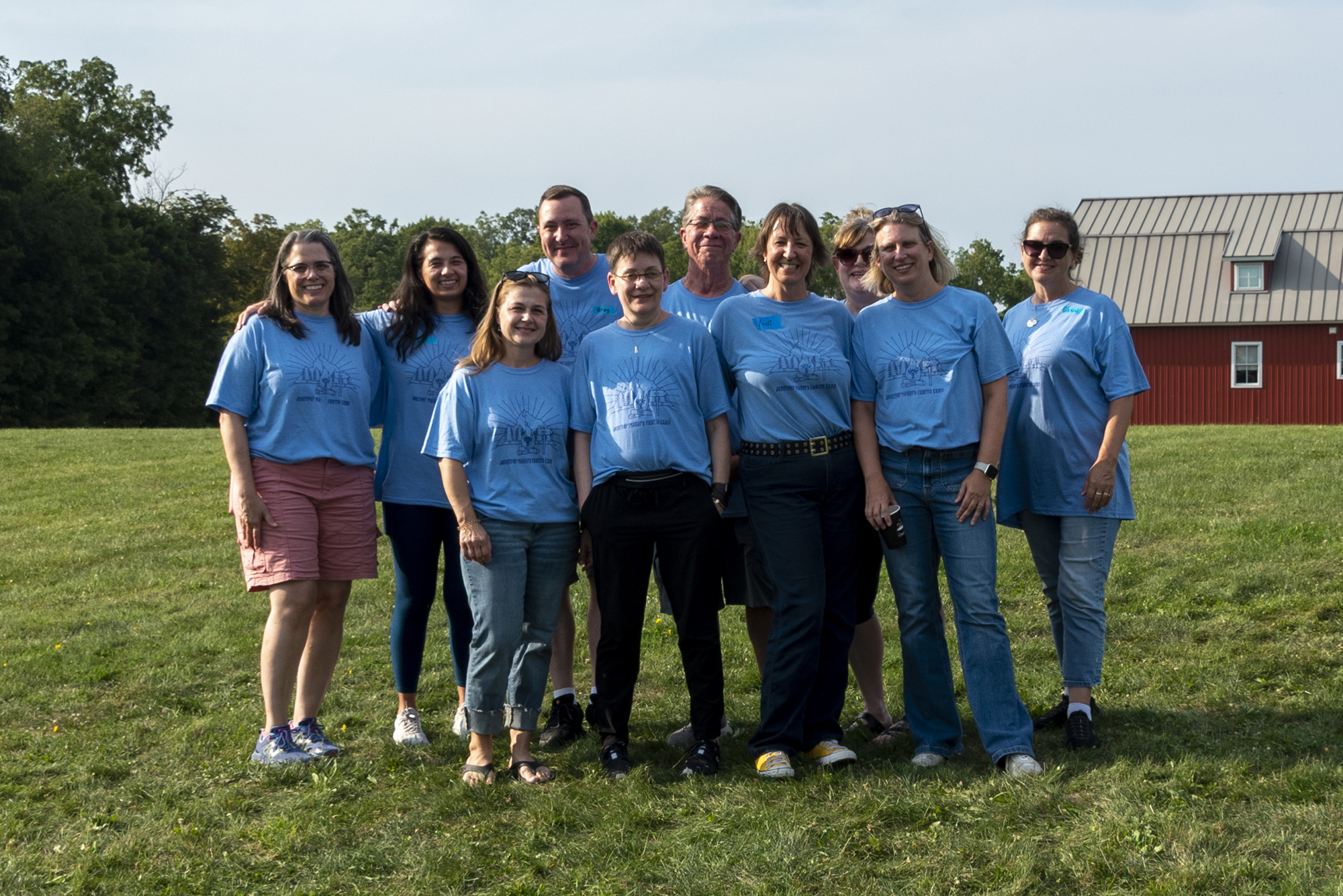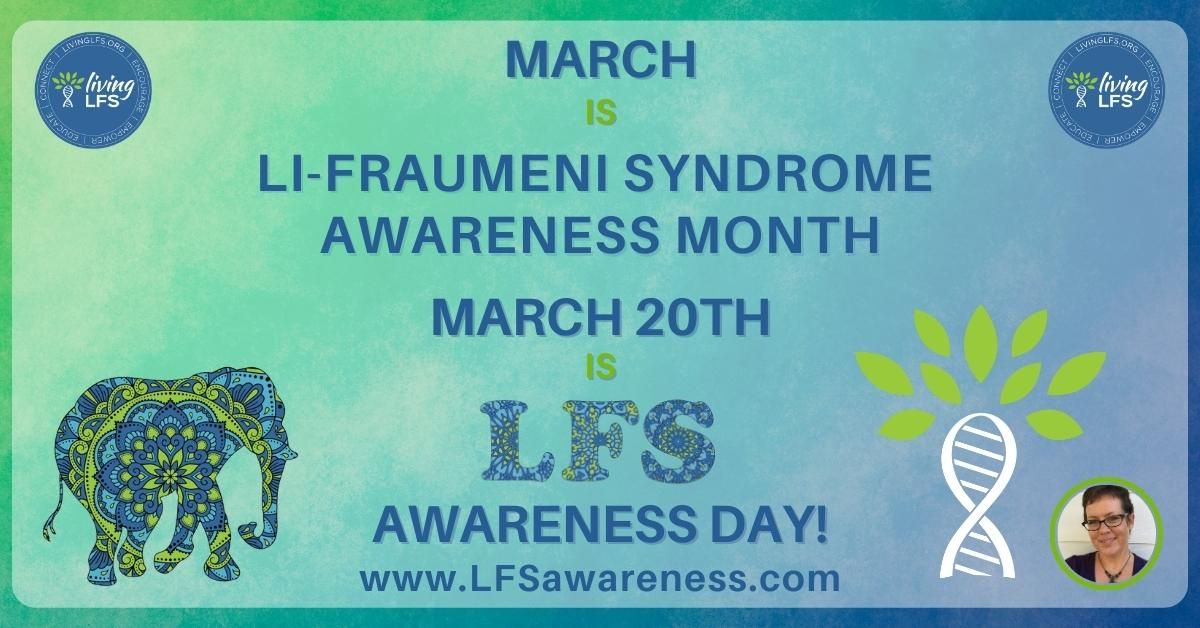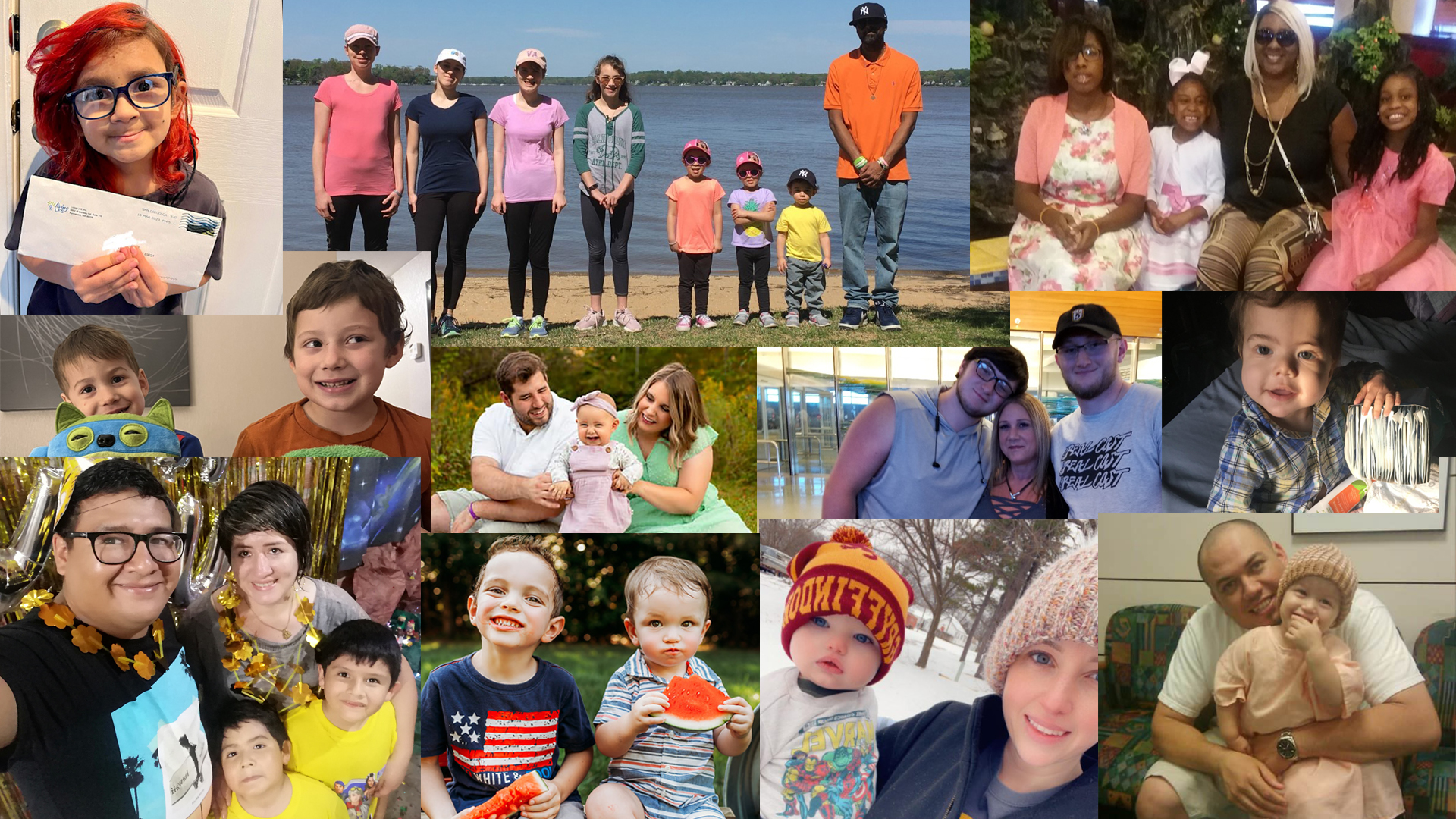When my cousin Jen asked me to write a blog entry about living with Li-Fraumeni Syndrome, I had no idea what I would even write about. “Am I really qualified to write about this? I've never even had cancer.” Not thinking of LFS as much as possible outside of annual check-ups and scans is a coping mechanism that I learned over the years. So, sitting down and actually putting my thoughts about LFS down seemed like a difficult task. I jotted some notes down here and there. Overall, I was really stumped on what to say which is odd ... for me. A few months of not being able to write anything went by, and then, within a few weeks, I found out that Jen's cancer had spread and our other cousin was diagnosed with breast cancer. I suddenly found that I was no longer at a loss for words.
I'm 30 years old. For the most part I consider myself a normal or even “lucky” 30 year-old. I'm married, I have a cool dog, a pretty nice apartment, a rare full-time job in television with benefits, multiple Apple products to my name, some disposable income after student loan payments, and some good friends. To an outsider, I'm living the modern day 30 year-old's dream. What most people don't know about me, however, is that I live with the constant risk of cancer that comes with LFS and that I've lived with it most of my life. I have a lot of concerns that most people my age can't fathom. When most sane people my age find a swollen lymph node, their first thought is that its probably from a virus. My first thought is “What organ does that lymph node drain and do I have any other symptoms of cancer from that particular organ?”Most people my age would be super psyched if they lost 5 pounds in one month. My first thought is “Did I actually exercise that much or could I have leukemia?” And so on.
Most of my friends and co-workers think I'm a hypochondriac. I guess I see where they might get that idea from. For a young and relatively healthy person I go to the doctor a lot and I have a team of about 10 of them that I've been building over the years. When I'm not visiting one of them, I'm probably having an MRI or an ultrasound or getting my blood drawn. When I try to explain LFS to close friends, their eyes usually glaze over. When I try to explain what it means, people seem almost annoyed. I get a lot of snark faces like maybe they think I enjoy getting all of these tests done or spending 2 hours in a waiting room somewhere when all of my friends are at a happy hour. Trust me, I'd rather be at that happy hour spending my money on margaritas and tacos - not this $100 co-pay.
Rarely, people have asked me questions out of genuine interest. Maybe twice ever people were engaged enough to ask me what it must be like to have the constant threat of cancer looming over my head every day or what it was like growing up knowing about it or how many of my family members have died. Actually, no. I don't think that's ever happened. Its not like I'm friends with Oprah or something. But maybe if I was, I would tell her that unlike a lot of other people's LFS journeys, mine started when I was quite young.
Someone in my family discovered a magazine article about the TP53 mutation in the early 90's after my mom was diagnosed with breast cancer at 32 and both my little brother and cousin were both diagnosed with brain tumors. I read the article when I was probably about 9 or 10. I understood that if a parent had the mutation, each child had a 50% chance of also having the mutation. Around the same time, some medical person allegedly told my mom that the odds were in my favor (yeah, just like the Hunger Games). Since so many people in my family had the mutation, it would be unlikely that I would also have it. My mom and all four siblings had it. My brother and one of my 6 cousins had it. My grandfather had it. His mother probably had it. This mutation goes back at least 100 years. Most girls get a fancy piece of jewelry or a set of china passed down from their great-grandma. Nope. Not in my family. The only precious family heirloom I inherited was my genetic code. Additionally, most girls traditionally have to wait until they're a responsible age to get that fancy jewelry or china because they can't be trusted to care for it at such a young age. I got my inheritance at 9. "Hey, descendant of mine! Here is something way more delicate than your little brain that has yet to emotionally mature has the capacity to understand and now you must take care of it! And, oh, you have to keep it a secret because you might not be able to get health insurance someday or no one will want to marry you if they know that your kids might end up with this, too!"
Someone in my family discovered a magazine article about the TP53 mutation in the early 90's after my mom was diagnosed with breast cancer at 32 and both my little brother and cousin were both diagnosed with brain tumors. I read the article when I was probably about 9 or 10. I understood that if a parent had the mutation, each child had a 50% chance of also having the mutation. Around the same time, some medical person allegedly told my mom that the odds were in my favor (yeah, just like the Hunger Games). Since so many people in my family had the mutation, it would be unlikely that I would also have it. My mom and all four siblings had it. My brother and one of my 6 cousins had it. My grandfather had it. His mother probably had it. This mutation goes back at least 100 years. Most girls get a fancy piece of jewelry or a set of china passed down from their great-grandma. Nope. Not in my family. The only precious family heirloom I inherited was my genetic code. Additionally, most girls traditionally have to wait until they're a responsible age to get that fancy jewelry or china because they can't be trusted to care for it at such a young age. I got my inheritance at 9. "Hey, descendant of mine! Here is something way more delicate than your little brain that has yet to emotionally mature has the capacity to understand and now you must take care of it! And, oh, you have to keep it a secret because you might not be able to get health insurance someday or no one will want to marry you if they know that your kids might end up with this, too!"
I'll spare you the lengthy and detailed family history. A lot of people in my family were sick. I spent the majority of my formative years visiting or living in hospitals, watching people go through chemo and radiation, and being shuffled back and forth between relatives. I saw a lot of catheter dressings being changed. I missed a lot of school. I was forced to go to school even when I was up all night with my brother while he had a fever or was throwing up or having a seizure or he just wanted to watch “The Goonies.” I ate many a disgusting casserole that was left on our porch by some thoughtful, but probably weird, neighbor. I hated the smell of fresh flowers because they reminded me of memorial services and funeral homes. I hated being pulled out of class because it always meant that someone was going to die or someone did die. The smell of hospital sheets and blankets made me both gag and feel at home at the same time. I felt left out and excluded when my parents would disappear for weeks and I would have no idea if and when they were coming back and when they did come back, they wove tales of goofy hospital roomies or magical nurses that I knew nothing of. I made a lot of little buddies hanging out in hospitals so much. Most of them died, too. I've noticed that people get freaked when I speak so candidly about my experiences with LFS, cancer, and death the way people my age might talk about their first Nintendo system or the neighborhood ice cream truck. But, I don't know what else to say because for me THAT was Growing up LFS.
I always wanted to be tested myself, but I didn't go through with it until 2009 when I was 26. I lost 30 pounds in two months for no explicable reason. Something your average 26 year old would celebrate. The genetic specialist that I saw told me she couldn't get any tests covered unless I tested positive for the mutation. She was really into reproductive issues and constantly wanted to talk to me about my conception options. I was really more into figuring out if I was dying or not. When the genetic counselor called with my results, she asked if I was ready to hear them. I don't think I could have been any more ready. I put myself through psychological and emotional training for this eventuality for about 15 years. I tested positive for the mutation and immediately had a brain MRI and breast MRI. Then, I fired that doctor and spent weeks searching for a new one, a better fit. She went fast to work assembling “My Team.”The last 4 years have not been without bumps in the road, but I'm not as scared as I used to be because I know I'm in excellent hands.
Since then, I try to stay on schedule with all of my appointments and scans. I have good days and bad days. A good day is one where I'm not waiting for test results or I don't have a lingering ache or pain that I can't explain away. A good day is when I don't think about LFS all day and I feel like a “normal person.” A bad day is when I look at a family picture and completely break down because so much of my family is missing. A bad day is sitting in a room with a bunch of crazies for two hours waiting to get my blood drawn and when I finally get to a tech, they can't find a good vein and I'm bleeding all over and then I get a huge bruise and I have to go to work and pretend to listen to an a co-worker freak out about something that's not an actual problem. A bad day is when I find out my cousin's cancer is back and its in her lungs and all I want to do is go to the Grand Canyon and yell “THIS IS NOT FAIR”but I have to stay at work and glue pom-poms on a chicken puppet costume. All the while, reminding myself that my problems are relatively minor in the grand scope of things because most people with LFS have it so much worse and I'm one of the "lucky ones". That is Living LFS.
For me, life has been about trying to find a delicate balance of reality, awareness, and cautiousness. I try to eat relatively healthy and I don't smoke. I don't stand in front of running microwaves on purpose and I put off dental X-rays. I get all my tests done. I listen to my body. I've learned that not every lump/pain/ache is a possible tumor, but some of them might be. If someone told you that you had 93% chance of getting into a horrible bicycle accident, you'd probably stay off of bikes, right? As a women with LFS, I have a 93% chance of having cancer and it will most likely be breast cancer. But I have no choice. I have to ride that bike and I can't get off of it. I take that 93% chance into consideration as I weave throughout town and I'm as careful as I can be. I'll always have that 93% in the back of my mind, but that's not my primary concern. If I thought about that 93% all of the time, I'd miss the scenery and the feeling of wind on my face.


